Iranian Deported From US For Suspected Ties To Terrorism

An Iranian, who is a resident of Canada with alleged ties to terrorism, was deported from New York by US authorities to face assault charges in Canada.

An Iranian, who is a resident of Canada with alleged ties to terrorism, was deported from New York by US authorities to face assault charges in Canada.
The deportation, by the US Immigration and Customs Enforcement (ICE), deemed the individual a "national security priority" due to suspected activities that pose a threat to national security.
The identity of the deported individual remains undisclosed, and crucial details pertaining to alleged terrorism connections and the specific assault charges in Canada have not been made public. This has led to lingering questions about the process through which the individual obtained permanent residency in Canada, especially in light of apparent security concerns.
The person's attempt to enter the US on October 10 via the Rainbow Pedestrian Walkway in Niagara Falls was denied by US border security. But two days later, he was apprehended for illegally entering the US near the Whirlpool Bridge Port of Entry in Niagara Falls.
In November, ICE's Enforcement and Removal Operations (ERO) issued an expedited removal order. The deportation to Canada was executed under the Safe Third Country Agreement, with the individual handed over to Canadian Border Services Agency authorities.
ERO Buffalo Field Office Director Thomas Brophy commented about the deportation, stating, "The return of the Canadian resident to face charges in Canada is a result of the dedicated efforts of officers on both sides of the border working collaboratively to ensure public safety in our communities."
The Safe Third Country Agreement, integral to the US-Canada Smart Border Action Plan since December 2004, mandates that refugee claimants seek protection in the first safe country they enter, unless they qualify for an exception.
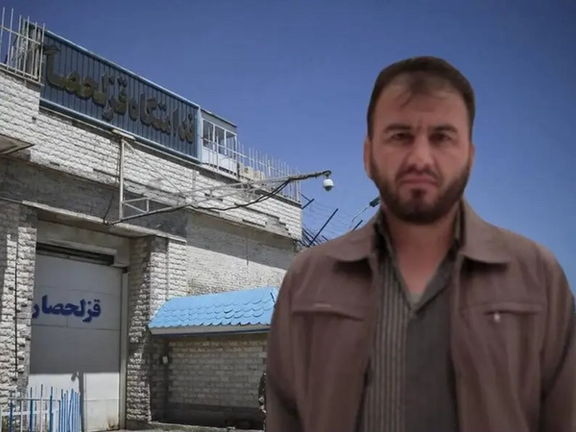
Davoud Abdollahi, a Sunni prisoner sentenced to death, has been transferred to solitary confinement in Karaj near Tehran, a sign of imminent execution in Iran.
Abdollahi was moved to solitary confinement on Tuesday, heightening anxiety among his family and loved ones in light of his death sentence.
The Hengaw Human Rights Organization, a Kurdish rights group, expressed deep concern over the transfer and the imminent danger of his execution, calling for an "immediate halt to this action and a review of his case in line with international standards of justice."
Abdollahi was among a group of seven Sunni prisoners who were detained in 2009 and were transferred to the detention center of the intelligence agency in Urmia (Orumiyeh) City. They were transferred to Tehran several months later. They were tried in 2015, and subsequently sentenced to death. These sentences were confirmed by the Supreme Court in 2020, after years of legal battles. Two of Abdollahi’s co-defendants, Ayub Karimi and Qasem Abasteh, were hanged in November.
The charges against them include "War against God," "corruption on earth," "support for Salafi groups," and the alleged "murder" of Abdolrahim Tina, who was killed by unidentified assailants in September 2008. However, in letters published by human rights organizations in recent years, the accused consistently denied these accusations.
Ahmadreza Haeri, a political prisoner, wrote from prison, "The entire trial did not last more than two minutes. Judge Moghiseh said first, you are a Kurd! Second, you are Sunni! Third, you have Salafi beliefs! These are the three reasons for the execution."
Iran has hanged nearly 750 people this year alone, according to the latest report by the US-based Human Rights Activists News Agency (HRANA).
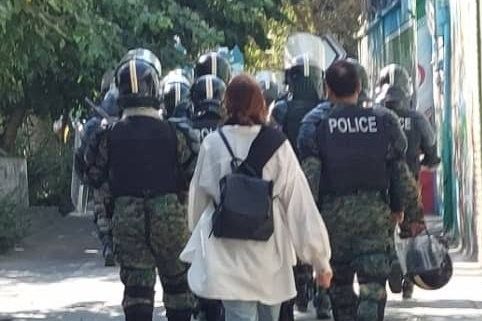
An Iranian lawmaker says the “Chastity and Hijab” bill will extend to government officials not supporting the crackdown on hijab refusers.
“Our main and most serious argument in this bill is to tackle professional hijab criminals”, Mehdi Baqeri, a member of the Judiciary Commission of the Iranian Parliament, told Rouydad24 news website.
He blamed governmental institutions in Iran for not meeting their obligations with regard to the implementation of compulsory hijab laws, adding that in case of the final ratification of the “Chastity and Hijab” bill, the officials negligent on their hijab duties will face legal measures.
According to the lawmaker, the bill will criminalize the government officials’ “shortcomings and inefficiencies” regarding hijab enforcement and they can even be fired from their jobs.
We have companies in Iran that promote “the culture of nudity” by producing “unconventional” and “vulgar” clothes, and there are people who sell these items, Bagheri added, urging the “severe and harsh” punishment of both groups.
In September, the Iranian parliament green lit a bill titled “Protection of Family Through Promotion of Hijab and Chastity Culture.” Initially introduced by the government and subsequently amended by parliamentary hardliners, the legislation outlined penalties, including substantial fines, for women diverging from the prescribed Islamic dress code.
Unexpectedly, the constitutionally mandated 12-member Guardian Council, wielding ultimate authority over legislation, rejected the bill. The Council cited formal deficiencies, including the ambiguity of specific terms in the text, prompting a call for parliamentary revisions.
While some speculate that the rejection stems from formal issues, others posit that the Guardian Council may be cautious about potential increased public discontent before the upcoming parliamentary elections in March.
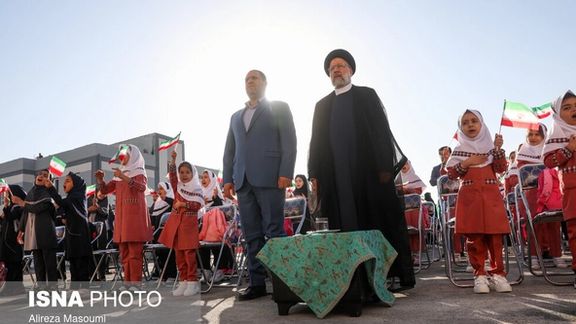
School teachers have claimed regime reforms have turned the country's schools into “religious and military bases”.
In an interview with Khabar online on Monday, teachers expressed concern about the plans to "shift schools away from their primary function", resulting in a "dead end" for children.
Teacher Mohammadreza Niknejad told Khabar Online that “authorities have failed in the education sector” as students do not accept today's school teachings. Furthermore, he added that ideological and religious studies have taken over most of the content of the school curriculum, even science, causing students to lose interest in the subject.
In line with the government's propaganda policies and the order of Supreme Leader Ali Khamenei the content of textbooks has changed in the last few years. In November, Reza Morad Sahraei, the Minister of Education, insisted on the need for gender-specific school curricula and confirmed changes in textbooks.
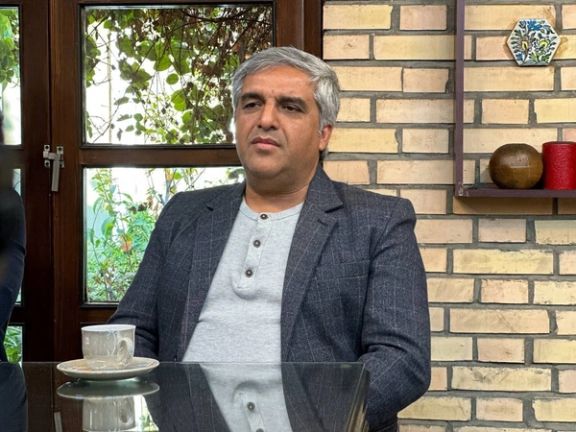
Sahraei also stressed the Islamic Republic's rejection of both the "Eastern perspective" and the feminist perspective, deeming the latter to be "deviant." A second teacher, Narges Malekzadeh, also noted the role students played in last year's protests and warned of future demonstrations: "If we do not maintain communication with students, they may become frustrated and protests may happen again."
Teachers staged a mass demonstration since the government did not take any tangible measures to identify and pursue the perpetrators, or to explain what was happening to their terrified parents and students. According to Amnesty International's report in April, since November 2022, thousands of schoolgirls have been poisoned and hospitalized in Iran. A trend that also continued at the beginning of this academic year.
In response to teachers' and students' protests, the government introduced a program of mass dismissals at schools known as the 'purge'. A tightening of security was also implemented around teacher recruitment. There is now a six-month selection period for teachers in non-government schools, in addition to the standard 15 days.
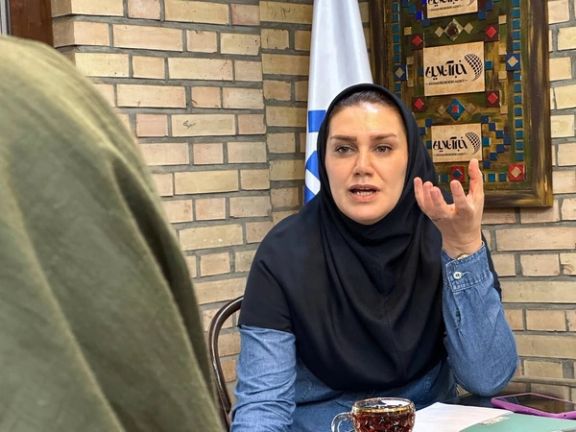
To compensate for the lost staff caused by the “purge”, the Education Ministry integrated religious teachers into the school system. Under a program called “Amin”, they recruited 21,000 seminary graduates to teach in 7 thousand schools. Ministers in President Ebrahim Raisi's administration have praised the "revolutionary" nature of the education ministry. In September, it was reported that Iran's Minister of Education had replaced over 20,000 principals.
The presence of religious teachers as part of the "Amin" program has become common at schools, however, students have a “negative attitude toward them and also they have a negative attitude towards students,” Malekzadeh explained.
In addition, the Education Ministry announced in December that seminary-affiliated schools will be established as part of the ministry's "Mosque, School, and Home" initiative.
In October, Russian President Vladimir Putin announced his intention to open Russian schools in Iran, though questions remain as to the nature of the proposed curriculums and their place in Iran's evermore religious Islamic curriculum.
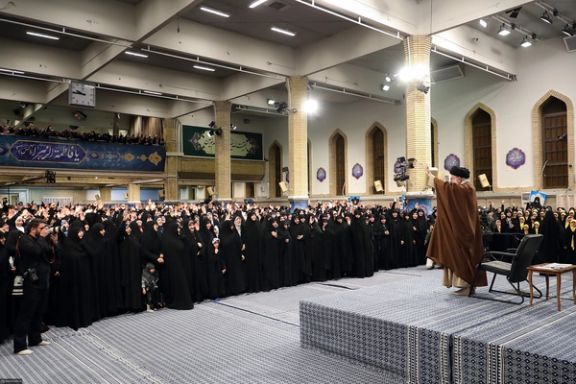
Iran's Supreme Leader has told an all female audience "you can play an important role in the elections" with voter turnout expected to be as low as 15 percent.
In a direct appeal for the upcoming March elections, Ali Khamenei said, "In the home, you play the most important role. Mothers can play a role in educating their children and spouses about the importance of being involved in the electoral process.”
Khamenei's hardliner supporters have used various methods to prevent other regime factions from competing in parliamentary and presidential elections since 2020.
The same tactic is being used for the March 1 legislative elections, and voters have lost interest in what they see as Islamic Republic's electoral machinations. Many do not see if going to the ballot box would make any difference to their futures.
Khamenei also stated that women have a greater capacity for details and a “better ability to recognize people and strategies ... The women are better able to identify the most qualified candidates than the men.”
In what seemed like a premeditated bid to engage a disenfranchised female population amidst the Women, Life, Freedom uprising as elections approach, the Iranian dictator added that, “A woman may hold any type of position, including managerial, governmental, and parliamentary positions. Meritocracy is the criterion for selection”.
However, cementing what he sees as women's main function, he added, “There is, however, a crucial requirement that women won’t be ‘deprived’ of that important and fundamental ‘feminine task’, i.e. housekeeping and childbearing ... Fortunately, there are some men who are willing to ‘assist women’, with housekeeping.”
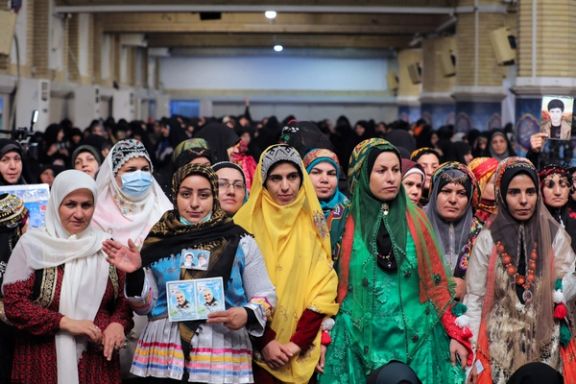
While defining “housekeeping” as a “woman's job” and saying some men “happily help women with that”, he also said, “We should not say housekeeping is women’s job.”
The inconsistencies present in just a few minutes of Khameni's speech may stem from his attempt to use modern concepts of equality to superficially appeal to women, his sole audience at Hosseiniyeh, after the 2022 women-led uprising sparked by the death in morality police custody of Mahsa Amini.
His emphasis on meritocracy comes at a time when, according to the Global Economic Forum's 2023 Global Gender Gap Report, Iran ranks 143rd out of 146 countries in terms of gender equality.
"Pakistan, Iran and Afghanistan are at the bottom of both the regional and global ranking tables," wrote the report.
Also in the Women’s Workplace Equality Index, published by the Council on Foreign Relations, Iran is among the 5 bottom-ranked countries regarding women’s workforce equality, alongside Sudan, Qatar, Syria and Yemen.
After praising women's progress in a variety of scientific and artistic fields, he emphasized the importance of revolution and Islamic values as decisive factors. In praise of the hijab, he said: “Hijab doesn’t mean discrimination and exclusion, but rather safety.”
In the meantime, the new division of the regime that enforces the hijab is violating the privacy of citizens by searching their personal belongings and imposing surveillance on them to take away their freedom of choice in how they dress.
Only in Iran and neighboring Taliban-controlled Afghanistan is wearing a hijab for women still mandatory.
The fact that these hijab enforcers are in plain clothes without permits or documents increases the possibility of criminals exploiting the situation. The harsh behavior of these agents has led to nationwide protests last year that lasted for months.
Mahsa Amini, 22, died in the custody of the morality police last September sparking the biggest uprising in recent history. A similar incident occurred this year with Armita Geravand, a 16-year-old student who was severely injured by Tehran's hijab police. She died while in hospital in October.
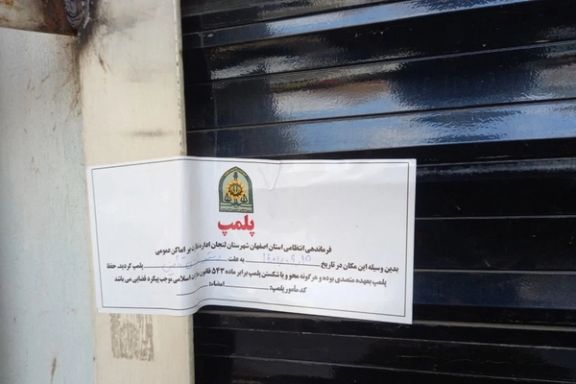
A minimum of 50 businesses in Iran's religious city of Qom have been closed down for non-compliance with compulsory hijab regulations.
Mehdi Ali-Babaei, the head of the secretariat of the Dey 19 cultural and social headquarters in Qom, revealed on Wednesday that “an additional 65 businesses received written and text message warnings regarding their failure to adhere to the hijab regulations.”
The crackdown on businesses is part of a broader response by the Islamic Republic to civil protests against mandatory hijab, which have gained momentum following the death of Mahsa Amini in custody last year. Amini's arrest, labeled as "unfitting hijab" by morality police, triggered months of protests across the country.
In recent months, authorities have implemented stringent measures to enforce hijab rules, including the impounding of cars if passengers defy hijab regulations. Additionally, businesses such as cafes, restaurants, and shopping malls have been shut down for non-compliance, and celebrities who defy hijab rules have been barred from acting in films.
On September 20, the Iranian parliament approved the "Chastity and Hijab" bill, which proposes severe penalties for opponents of compulsory hijab. Originally drafted by the government and later modified by the parliament's hardliners, the legislation suggests various penalties, including substantial fines for women who do not adhere to the prescribed dress code of the Islamic Republic. This dress code mandates a headscarf covering all hair and shoulders, a loose long tunic with long sleeves, and trousers that cover the legs below the ankles.